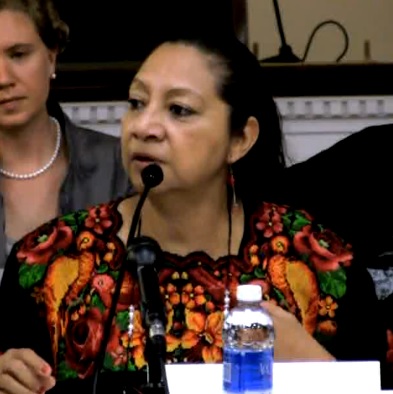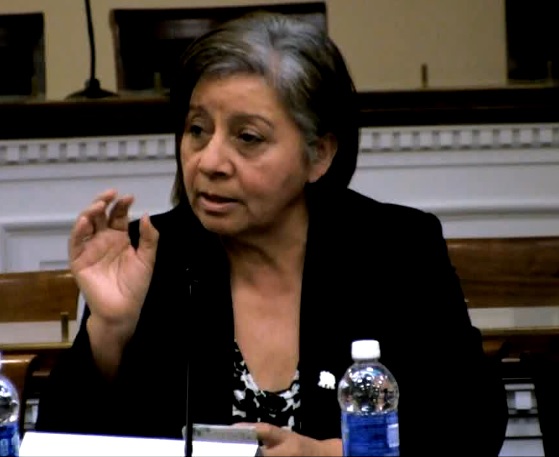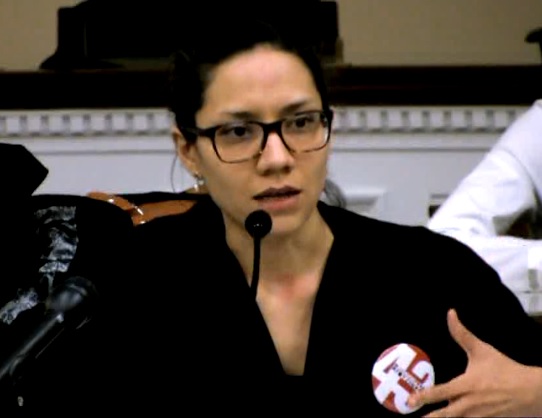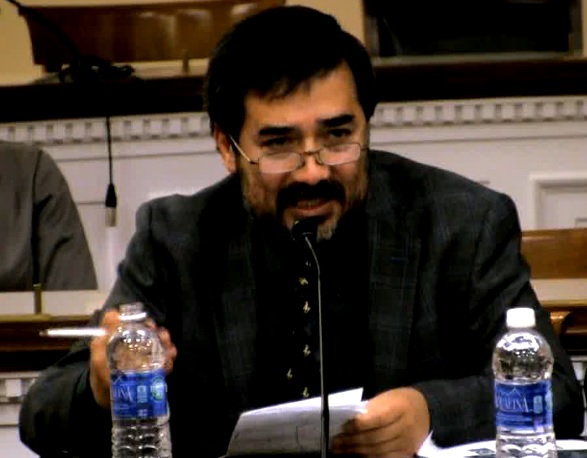November 13, 2014
During a visit to Washington in late July, Honduran President Juan Orlando Hernández and Guatemalan President Otto Pérez Molina jointly called for a regional security initiative modeled on Plan Colombia in response to the rampant violence sweeping their countries. In an October 29th Congressional briefing, human rights advocates from Honduras, Guatemala, Mexico and Colombia made a distinctly different appeal. Describing how militarized security programs cut from the same cloth as Plan Colombia had undermined human rights and democracy in their countries, they earnestly called on the U.S. Congress to reconsider its ongoing support for these programs.
The briefing, hosted by the office of Representative Hank Johnson (D-Georgia) and co-sponsored by the Center for Economic and Policy Research, the Guatemala Human Rights Commission, Just Associates, CISPES and CIP-Americas, was entirely videotaped by CEPR, and can be viewed here (in Spanish with no subtitles).
For those who are interested in these issues but don’t speak Spanish or have limited time, we provide a translation of key excerpts from each of the four powerful presentations made by the human rights defenders.
First, a quick summary of the event:
Iduvina Hernández Batres, Director of the Association for the Study and Promotion of Security in Democracy, discussed how the U.S. security agenda in Guatemala undermines citizen security. Bertha Oliva, Coordinator of the Committee of the Detained and Disappeared in Honduras (COFADEH), talked about how abuses by U.S.-backed security forces have increased, while judicial authorities justify rather than investigate the violence. María Luisa Aguilar López of the Mexican human rights organization Tlachinollan, explained how the recent disappearance of 43 students in Guerrero is not an exception, but rather a representative case in a country that has recorded at least 22,000 forced disappearances since the U.S.-backed, militarized drug war began in Mexico in 2006. Alberto Yepes, coordinator of the Human Rights Observatory of the Colombia-Europe-U.S. Coordination, described the dire effects of Plan Colombia on human rights and democracy in Colombia, including thousands of extrajudicial killings and disappearances, and how the U.S. is now helping export the Colombian model to other countries.
Kathryn Johnson, from the Washington office of the Guatemala Human Rights Commission, moderated the panel. In her introductory and closing remarks she shared passages from a statement by the MesoAmerican Working Group on the impact of U.S. security assistance on human rights in Mexico and Central America, including policy recommendations for U.S. lawmakers. The statement is available here [pdf].
Here are translated excerpts from each presentation:
Iduvina Hernández Batres, Director of the Association for the Study and Promotion of Security in Democracy, Guatemala.

“What does it mean when our governments and authorities develop security agendas and policies based, not on the needs of the population and on their responsibility to guarantee the right to life, the right to freedom, and the full enjoyment of every right, but instead on the interests and concerns of another country, in this case on the anti-drug policy of the U.S. government, on its anti-terrorist policy, on its anti-immigration policy? (…) This has [for Guatemala] meant a process which, over the last ten years, has led to virtual disappearance of civil security forces.
“I ask you to imagine that, instead of police forces in the streets of each one of your cities and states, you constantly see members of the armed forces; that, instead of filing a criminal complaint before judicial authorities, you actually must do it before a military authority. This is the reality we live day by day. (…) Similarly to what occurred during the internal armed conflict of the 1980s, there is a military deployment that stretches across all of the national territory.”
She notes that the Guatemalan armed forces haven’t been purged since the 1980s despite enormous human rights abuses; how military equipment, like grenades has ended up in the hands of drug cartel members; and how the military apparatus is working to destroy the limited independence of the judiciary. Otto Pérez Molina, a former general suspected of responsibility for human rights abuses during the 80s, is asking the U.S. government for support to further strengthen the army, saying that “they need more support to guarantee that this institution remain in charge of citizen security for Guatemala.”
“I come to you with the voice of my brothers and sisters in Guatemala (…), with the voice of pain of the disappeared, with the pain of the bus drivers that are killed on a daily basis. (…) We don’t want the strengthening of institutions that, instead of protecting our lives, continue to put them in constant danger. (…) We want to walk in the streets as you do here (…) enjoying the possibility of walking without fear of being detained at any moment and becoming victims of illegal actions on the part of security forces like the armed forces, that haven’t been trained to deal with citizen security. We’ve come to ask you that, before authorizing a security policy based on the needs that could arise over here, you consider that this policy shouldn’t be pursued if it creates victims in our societies.”
Bertha Oliva, coordinator of the Committee of the Families of the Detained and Disappeared in Honduras (COFADEH).
“We have returned to the old days [of rampant militarization], we’ve gone back something like 30 years when we first began looking for victims of disappearances… We’re seeing the reappearance of the odious practice of forced disappearances that we thought was a thing of the past.
“It is the same actors that have committed crimes against humanity that are, in the name of security and democracy, committing new, strong violations of human rights. We can’t advance, and it can’t be said that there is an interest in our country in strengthening the democratic state, because democracies don’t grow stronger with military troops in the streets.

“We’ve seen the return of civil-military actions, sometimes attributable to the military police [force], sometimes attributable to military policing, but that combined have led to profound human rights violations.
“When we talk about militarization, it’s not just about seeing military troops in the streets. It’s about the effects of their presence that we experience on a daily basis. (…) We’re talking about torture (…), extrajudicial executions.
“Violence and insecurity is growing worse. Now it’s not one, but two to seven people that are killed in a single incident (…) and there is no action on the part of judicial agents that is oriented toward investigating and sanctioning those who are responsible. (…) Judicial authorities limit themselves to producing information about the victims: ‘they were gangsters, or they were members of an organized crime group’ (…) it appears as if they’ve prepared a profile of the person to justify the killing.
“International accompaniers [of human rights defenders and of communities defending land rights] are also subjected to illegal and arbitrary detentions (…) and the state is incapable of investigating. It is only capable of justifying.”
She reminds the audience of the constant threats and intimidations that human rights defenders face in Honduras, including herself. “Today I’m fearful of speaking. (…) A year ago, there were two of us here speaking about Honduras (…) Before we’d even returned to our country there was a campaign and an official report stating that we were discrediting our country and that, therefore, we were bad Hondurans.”
“Why are so many young [Hondurans] going to the U.S. today? It’s because of bad security policies.”
María Luisa Aguilar López, Tlachinollan, Mexico.
“Mexico is a country that, outside of Mexico, is portrayed as being a country of reforms, a country that’s in the vanguard, that’s progressive, that’s among the 20 strongest economies of the world. And within Mexico we see a country that is deeply damaged, with a social fabric that is completely torn apart, with a human rights situation that is truly deplorable (…) with many documented cases in which public authorities and organized crime are completely co-dependent (…) with an economy based on extortion.”
She discusses the creeping militarization throughout Mexico, how the country’s public institutions have become progressively militarized. She discusses the gendarmería, a new militarized police force (similar to the new military police force of Honduras) involved in law enforcement but with military training. [Editor’s note: in mid October, Mexico’s Minister of Finance told investors that the gendarmería would provide security for private companies’ projects around the country, provoking cries of protest from Mexican human rights and environmental activists].

She discusses the case of the 43 missing students in Guerrero, which has sparked protests throughout Mexico and the world. “It is a representative case, not an isolated case,” she says, noting that there have been over 22,000 disappearances since the U.S.-backed drug war started in 2006.
“It demonstrates how the judicial system is incapable of properly investigating an enormous crime.”
She notes that over a month has passed since the 43 students disappeared and that all that investigators have produced so far are 11 mass graves, none of which appear to contain the remains of the students. [Editor’s note: Mexican authorities announced in early November that gang members admitted to incinerating the students after they were handed over to them by local police, but parents of the missing students have expressed deep skepticism regarding official accounts.]
“There is a clear problem of forced disappearances in Mexico… There is a clear problem of violence in Mexico. The U.S. needs to acknowledge this problem, as a neighboring country. To date, the U.S. government hasn’t recognized that just beyond its borders there is a grave problem of generalized violence, of forced disappearances, that can’t be solved by continuing to train and fund the armed forces.”
[In addition to Lopez’s presentation, CIP Americas distributed a fact sheet at the briefing entitled “Mexico in Crisis: U.S. Drug War Funding, Ayotzinapa and Human Rights Violations” which can be viewed here].
Alberto Yepes, coordinator of the Human Rights Observatory of the Colombia-Europe-U.S. Coordination:
He describes some of Plan Colombia’s main features: states of exception that sideline the rule of law; the creation of paramilitary groups, acting in coordination with military agents; clandestine operations, forced disappearances, torture, extrajudicial execution (false positives). He discusses the findings of a report co-authored with John Lindsay Poland [PDF] that looks at the role that U.S. security assistance played in the 5,763 “false positive” cases of extrajudicial civilian assassinations by Colombian military units. As these abuses occurred, between 2000 and 2010, Colombia received $6 billion in military assistance from the U.S. and sent military advisors to train troops and accompany operations. The Colombian army grew from 230,000 troops to a half million, thereby becoming the biggest army in Latin America.

He goes on to describe “the empowerment and preponderance that the military acquires over Colombian society (…) a veritable untouchable caste. These half million men have a big influence over the political system and even impact electoral campaigns in order to favor the candidates that are most supportive of the militarization of the country, as was witnessed in the last electoral campaign. Even more worrying is the military’s refusal to respond to the crimes committed during the armed conflict (…) They permanently demand that military troops not be investigated by ordinary [civilian] justice; the military has (…) imposed constitutional reforms and reforms to laws to ensure that the investigation and prosecution of military crimes is carried out (…) through military judicial authorities.
“This is the model that the U.S. has presented as a successful model. An export model that should be extended to other countries (…) Basically [this model] seeks to promote Colombia, or the Colombian army, to be used to build local capacity in the fight against organized crime. Colombia has thus been turned into the nerve center of U.S. security policy for the entire continent.”
He lists the quantity of troops trained by Colombian trainers in various countries: Mexico: 13,000 troops trained by Colombians; Panama: more than 3000; Honduras: around 3000; Guatemala: close to 2000, etc.
“Through proxies, the U.S. is involving itself in internal conflicts, doing the same sort of training that the U.S. used to provide at a lower financial and political cost. This development of military capacity has also been extended to the paramilitarization of other armies. You all know the Blackwater company, that later changed its name to Xe Services [Editor’s note: and then changed its name to Academi]. It has also been training in Colombian scenarios in order to export [the Colombian methods] to other parts of the world.
“There are also reports of retired Colombian military agents that have later participated in the training of police that have later lent their services to criminal groups, such as the Zetas in Mexico.
“So, let’s not believe that the Colombian model can be a successful model. The statistics of 30,000 disappeared in the internal armed conflict and close to 6,000 victims of extrajudicial executions doesn’t bode well for the possibility of exporting this experience to other countries.”
“(…) Finally, we consider that U.S. policies are incoherent. On the one hand, you have policies of the Department of Defense that basically seek to provide a lot of military support, a strong militarization, and strong support for the militaries in each country, and using indicators based in methods that ignore human rights considerations. On the other hand, you have parallel efforts in which the Department of State imposes conditions of respect for human rights, but that don’t manage to diminish the excesses and abuses that occur.”






